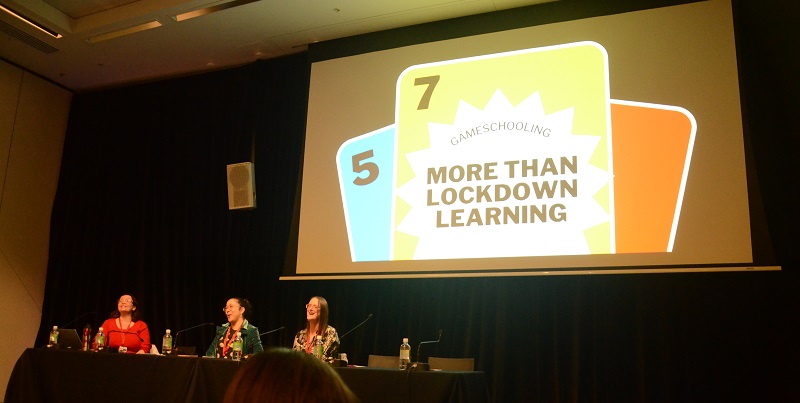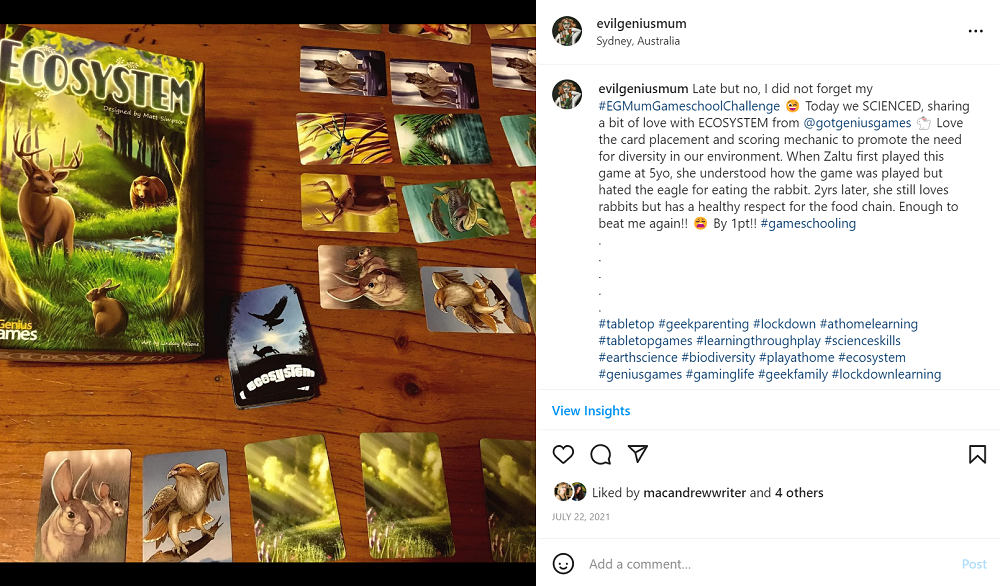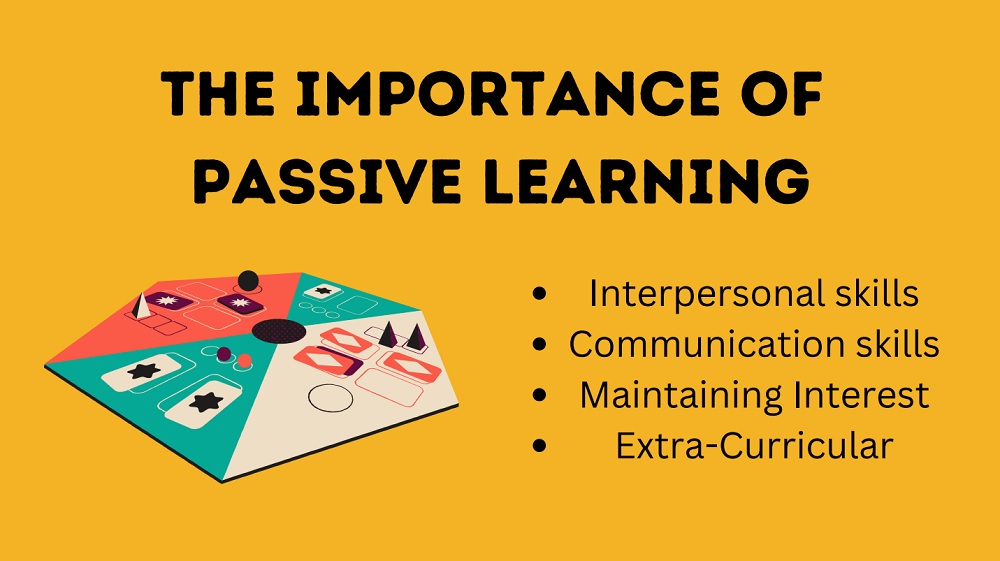
After two years of lockdowns and virtual events, PAX Aus 2022 saw the return of the coveted PAX panels. Melbourne, the host city, felt these lockdowns rather keenly as the most restricted and isolated city in Australia during the COVID pandemic. During that time, Gameschooling surged in popularity, with teachers facing an onslaught of questions about “learning through games” while homeschooling parents were begged to share their secrets. I was one of those begging parents.
Fortunately, I also know a network of people experienced in the world of Gameschooling. I was able to convince some of them to assist me with a panel at PAX Aus 2022 and share their advice with other parents. Just because the lockdowns have finished does not mean we must give up our Gameschooling. Nay. Gameschooling is MORE than lockdown learning.
It is our way of life.

Thanks to our participating panelists, Marcela Ramirez, Carolyn Martin, and Jaime Lawrence, for their insights and experiences. Special thanks also to Cat Timms, who was originally on our panel, but we were unable to arrange a Zoom link for her to join in on the day. Cat is also the administrator for the Facebook group Tabletop Gameschooling Australia and its new spin-off Video Gameschooling Australia.
What Is Gameschooling?
Here at GeekMom, we are fairly familiar with the idea of Gameschooling. Back in 2016, GeekMom Caitlin shared her insights about games in homeschooling. That’s exactly it in a nutshell: Games + Homeschooling = Gameschooling! It is the intentional use of games as educational tools. And it can be any kind of games: board games, tabletop, card games, dice games, and RPGs. And YES! It can include video games!
This is not a new concept found only in the homeschooling community. Teachers have been using game-based learning for years. I’m sure many of us would remember the “snakes-and-ladders” style games from elementary school, but instead of numbers, it had short arithmetic. You had to do the math to progress on the board. Some of those games were horrible and boring, but they still encouraged learning through play. Every now and then, you might find a teacher who had the more interesting games or at least knew how to make the interesting games educational.
Learning Through Play
For teachers, games can assist with expressing core elements in learning. It is about communication and conceptualization. Games in the classroom are often limited in both time to play and time to set up/pack away. For these considerations, it is often easier to work with games designed for a specific purpose. However, that’s where games often become over-simplified.
Gamification v Game-Based Learning
When choosing the best games for your Gameschooling experience, it is important to note the difference between Gamification and Game-Based Learning. Gamification is applying game mechanics to achieve desired behavior and learning outcomes, such as class points in school classrooms, leaderboards, and incentives. Gamification is a very common tool used for behavioral management and encouraging study habits. You don’t need games to gamify your learning experience.
Game-Based Learning uses game elements to teach a specific skill or encourage a specific learning outcome. The goal is not about winning but identifying the tasks and opportunities along the way. This is where your game collection comes into play. You can start by looking at specific games that include syllabus or core learning concepts as a way of including game-based learning. It’s also important to note gamification is a part of game-based learning, not the other way around.
Does Every Game Need to Fit the Syllabus?
Game-based learning does not mean you can only play games that fit the syllabus perfectly. While there are games out there designed specifically to certain syllabus points, there are equally as many games with more subtle applications to the learning experience. The only real benefit of matching a game with the syllabus is that it makes the subject more obvious. As you play more games, you will start to see syllabus features in a far wider range of games. However, if you are starting on this Gameschooling path, look for the more obvious connections first.
Story Time Chess is a good example of a game designed specifically for an educational purpose. The game teaches young children how to play chess through a series of short games based on a narrative display for each piece. For example, the King can only move one square at a time because he ate too much food; here is his story. There are many benefits to learning how to play chess (read more about it here). However, this is a game made specifically as a learning tool itself. (A full review of Story Time Chess is coming soon!)
On the other hand, there are games designed around themes that can work within a learning topic. The Gameschooling element comes from the student applying their knowledge and understanding to the game rather than learning directly from the game. For example, students who are working on Earth and Environmental Science can apply the same core concepts to a game of Ecosystem. For students attending school, the family game night can be a great way for families to understand how much their students are learning at school. It also helps reinforce learning through “brain exercise.” We can all benefit from using our brains in different ways.
The Importance of Passive Learning
It is very easy to be caught in the idea that games can only benefit the primary subjects—literacy, numeracy, and the education skills we can measure with hard evidence. Any teacher and homeschooling parent knows that education is far more than that. Our kids need to learn a range of “soft skills” as well (AKA interpersonal skills). After so many COVID lockdowns, parents also realized how quickly we lose our soft skills without adequate opportunities to develop them.
Many of these interpersonal skills fall into the category of “passive learning”—skills or techniques we learn not from direct teaching but from the environment we are learning in. These skills involve the ability to communicate and build relationships with others.
Marcela shared a great observation with us during the panel, noting the difference gaming makes to her work as an adult. As a communications specialist, Marcela relies on her ability to build narratives for her clients, negotiate with them, and strategize. Her gaming life, both as a child and now as a parent, has strengthened her ability and confidence to work with others.
One particular factor she noted was the return of agency to her life. During COVID lockdowns, many of us felt like we had lost control over our lives. Decisions were made in the best interests of the general public but with little power left to individuals. Playing games during lockdown gave us at least one activity with a sense of control over our lives. Be it during lockdowns, after lockdowns, or simply the rollercoaster that is our young schooling lives, children will always benefit from games that allow them autonomy over something important to them—even if it is just one small aspect. In turn, they learn greater executive decision skills and better risk assessment. RPGs, co-op games, and any game with a theme or storyline can help.
Gameschooling also supports many extra-curricular activities often overlooked because of the word “extra.” During lockdown learning, school events like public speaking competitions suffered greatly from students losing the confidence to participate in front of others. Creative and performing arts also diminished due to a lack of attendance during lockdowns. Each of these areas can be easily supported with Gameschooling, particularly with the use of RPGs. Storytelling and role-playing are great for teamwork and performance while painting miniatures helps develop fine motor skills and basic art appreciation.
Gameschooling After Lockdown Learning
So, now we know the benefits of Gameschooling and why, now is the time you have all been waiting for: how to pick the right games for you.
Short answer: Any game you want to play! Sorry, I know it sounds like a cheat answer, but it is true. We all have a favorite game, and it is easy to explain why. But the real secret is that we know how to make the game work for us. There are a few things to consider:
Before you start thinking about how this game will help your kids to learn more, take a good hard look at the game itself. Games are not cheap, and you want to make sure you are spending your money efficiently.
- Make sure it’s a game you want to play with kids; simple rules and game mechanics will be your friend. And don’t be afraid to change the rules to suit your kids. Eg. Uno says the official rules do not allow players to stack +2 cards. I say, if it encourages my kids to learn their 2x multiplication tables, then we shall follow the house rules!
- Make sure it’s made with good-quality parts; kids don’t want to play with broken parts.
- Great artwork will keep them interested, especially younger kids.
- If you can relate it to a topic easily, it will help reinforce the learning.
- Accessibility is important for everyone.
The Best Gameschooling Games
This was the list we showed at the panel, plus a few more I have added since then.
Tabletop:
- Literacy
- Snake Oil
- Poetry for Neanderthals
- RPGs with storytelling
- Numeracy/Math
- Math Rush
- Zeus on the Loose
- Turing Machine
- Sumoku
- Geography
- Boomerang: Australia
- Pandemic
- Railroad Ink
- History
- Imhotep
- Herstory
- Stone Age
- Paleo
- Evolution
- Floating Floors
- Science
- Photosynthesis
- Elemensus
Video Games:
- Minecraft
- Unpacking (storytelling)
- The Gardens Between (logic)
- Neon Noodles (logic and programming)
- Heaven’s Vault (deduction and core linguistics)
Some of these games have previously been reviewed on GeekMom and my personal Evil Genius Mum site. Others have reviews coming, so stay tuned.
If there is anything to take away from all of this, it is the wide opportunity it offers for all families to include a little more gaming in their lives. Gameschooling has been around long before we were hit with the global pandemic and lockdown learning. It will continue to grow with the passion and encouragement of teachers and homeschooling communities. Most of all, it will always be there for any geek families who want to give their curious kids a little educational support.
Click through to read all of "Gameschooling: More Than Lockdown Learning" at GeekMom.If you value content from GeekMom, please support us via Patreon or use this link to shop at Amazon. Thanks!



